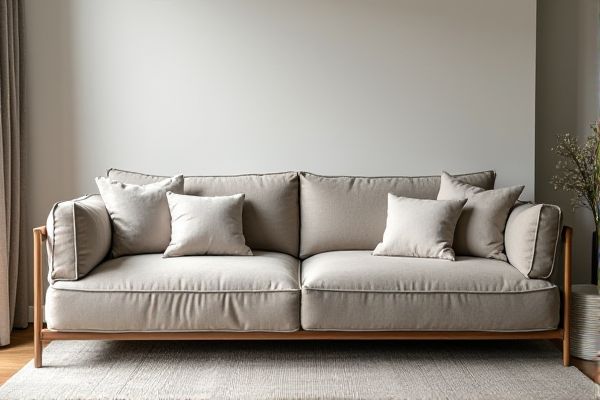
Microfiber couches offer superior stain resistance and durability compared to polyester couches, making them ideal for families and high-traffic areas. Discover which fabric best suits Your lifestyle and home by reading the full comparison in this article.
Table of Comparison
| Feature | Microfiber Couch | Polyester Couch |
|---|---|---|
| Material | Ultra-fine synthetic fibers | Synthetic polyester fibers |
| Durability | Highly durable, resistant to wear and tear | Moderately durable, less resistant to abrasion |
| Softness | Extremely soft and plush | Soft but less plush than microfiber |
| Stain Resistance | Excellent stain and water resistance | Good stain resistance, less water repellent |
| Cleaning | Easy to clean, often machine washable or spot clean | Easy to clean, spot cleaning preferred |
| Cost | Moderate to high price range | Generally lower cost |
| Appearance | Smooth, suede-like texture | Varied textures, less smooth |
| Common Uses | Living rooms, high-traffic areas | Casual seating, budget-friendly couches |
Introduction to Microfiber and Polyester Couches
Microfiber couches feature tightly woven synthetic fibers, known for their durability, stain resistance, and soft texture, making them ideal for high-traffic living areas. Polyester couches are crafted from a robust synthetic fabric that offers vibrant color retention and easy maintenance but may be less breathable compared to microfiber. Both materials provide affordable upholstery options with distinct advantages in comfort, longevity, and ease of cleaning.
Material Composition: Microfiber vs Polyester
Microfiber couches are made from ultra-fine synthetic fibers, typically polyester or nylon, woven tightly to create a soft, durable fabric that resists stains and wear. Polyester couches use fibers derived directly from polymer resins, resulting in a fabric that is strong, wrinkle-resistant, and less prone to fading but may be less breathable than microfiber. Understanding the differences in material composition helps you choose a couch that balances comfort, durability, and maintenance needs.
Comfort and Texture Comparison
Microfiber couches offer a soft, suede-like texture that feels smooth and luxurious, providing exceptional comfort ideal for long lounging sessions. Polyester couches tend to have a slightly coarser feel with a smoother, more synthetic texture that may be less breathable but easier to clean. The dense weave of microfiber fabric makes it more resistant to stains and wear while maintaining a plush, cozy surface, whereas polyester can feel less cushioned and cooler to the touch.
Durability and Longevity
Microfiber couches, made from tightly woven synthetic fibers, offer superior durability and resistance to stains, making them ideal for high-traffic areas and homes with pets or children. Polyester couches are durable but tend to show signs of wear faster, including pilling and fabric fading, due to less dense fiber construction. The denser weave of microfiber ensures longer-lasting performance and easier maintenance compared to standard polyester upholstery.
Stain Resistance and Cleaning Ease
Microfiber couches excel in stain resistance due to their tightly woven synthetic fibers that repel liquids and prevent dirt from embedding, making spills easier to wipe off. Polyester couches offer moderate stain resistance but tend to absorb liquids more quickly, requiring prompt cleaning to avoid staining. Cleaning microfiber typically involves mild soap and water without harsh chemicals, while polyester may need specialized fabric cleaners to maintain its appearance and texture.
Appearance and Color Options
Microfiber couches offer a smooth, suede-like appearance with a rich texture that enhances any living space, while polyester couches tend to have a shinier, synthetic look that can vary in finish. Microfiber fabrics come in an extensive range of colors and subtle tones, providing versatile options for stylish and modern decor. Your choice between microfiber and polyester will impact the overall feel and aesthetic of your room, as microfiber blends comfort with a luxurious look, whereas polyester emphasizes durability and vibrant color availability.
Pet and Allergy Friendliness
Microfiber couches offer superior pet-friendliness due to their dense weave, which resists pet hair accumulation and minimizes claw snags, making them ideal for homes with cats and dogs. Polyester couches, while generally durable, tend to attract and retain more pet dander and allergens, potentially triggering sensitivities in allergy-prone individuals. Your choice should consider microfiber upholstery for easier cleaning and reduced allergen retention, supporting a healthier indoor environment.
Cost Comparison: Microfiber vs Polyester
Microfiber couches generally cost more than polyester couches due to their durable, stain-resistant fibers and higher production quality. Polyester couches are typically more affordable and widely available, making them a budget-friendly option for furnishing your living space. Your choice between microfiber and polyester will depend on balancing initial cost with long-term durability and maintenance needs.
Pros and Cons Summary
Microfiber couches offer excellent stain resistance, durability, and a soft, suede-like texture, making them ideal for high-traffic areas and pet owners, but they can attract lint and may feel less breathable. Polyester couches provide vibrant color retention and affordability with easy cleaning options; however, they tend to be less resistant to wear and can trap heat, reducing comfort over time. Choosing between microfiber and polyester depends on factors such as household activity, budget, and desired fabric feel.
Choosing the Right Couch for Your Home
Microfiber couches offer exceptional stain resistance and durability, making them ideal for households with pets or children, while polyester couches provide a budget-friendly option with a wide range of colors and patterns. Your decision depends on the balance between maintenance ease and aesthetic preference, as microfiber requires less frequent cleaning compared to polyester. Consider your lifestyle and desired texture to choose a couch that complements your home's functionality and design.
 homyna.com
homyna.com